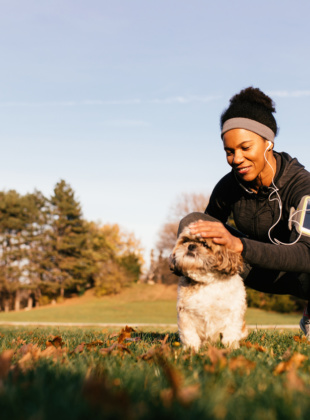Dating in a pandemic – US
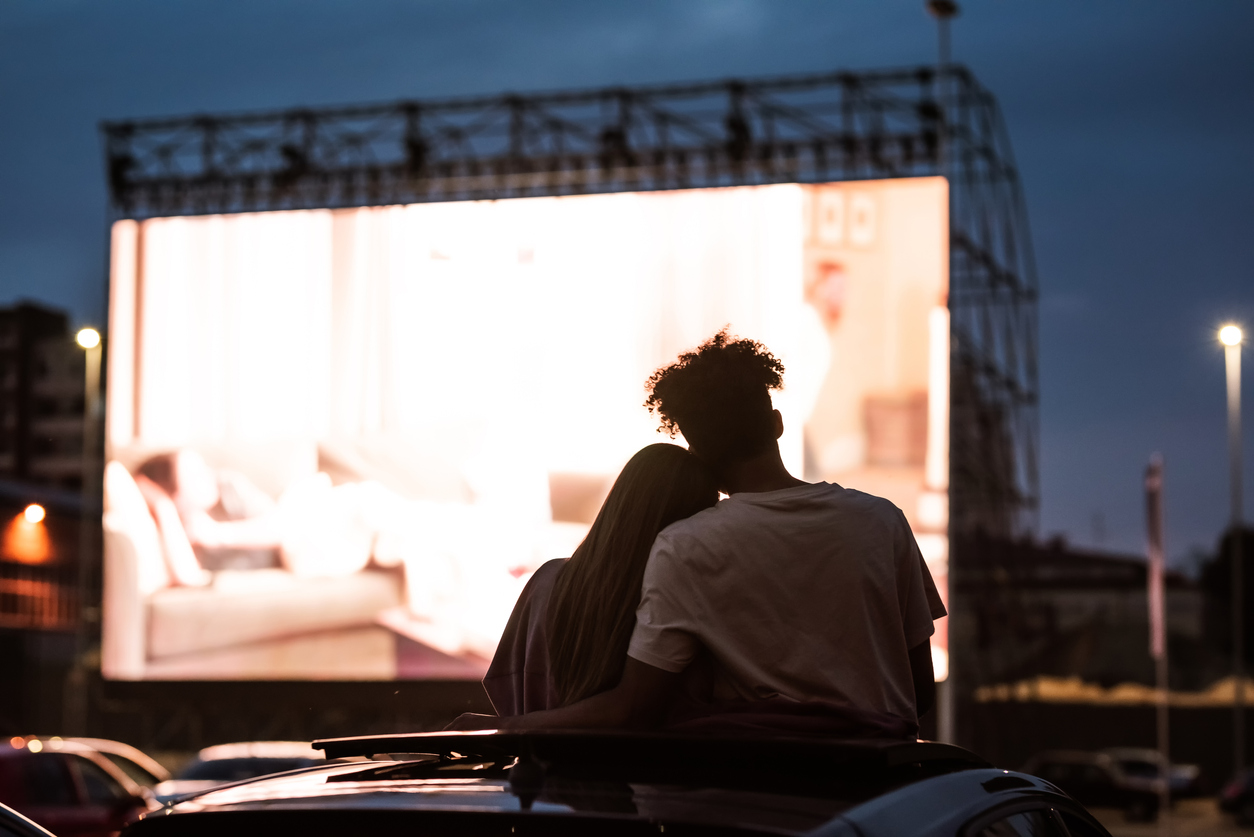
For 3 in 10 Americans (29%) Covid accelerated the pace of a romantic relationship
According to an Opinium survey on dating in the pandemic, Covid-19 did not slow down those on the lookout for love.
Despite precautions towards socializing (especially when it required being less than 6-feet apart), 45% of those who went on a date during the pandemic kissed. Moreover, 29% of Americans who dated during the pandemic experienced a romantic relationship progressing more rapidly than usual when compared to before.
Although the top two pandemic dating activities are relatively ‘normal’, Covid ushered in a series of firsts in the dating world. 28% reported wearing a mask for the entirety of the date, 19% went on a date outside because rate of infection was lower, and 18% self-isolated ahead of the date to reduce the chance of infection. Virtual dating became more normalized, with 19% of people reporting having gone on a date via a phone call and 18% via a video chat.
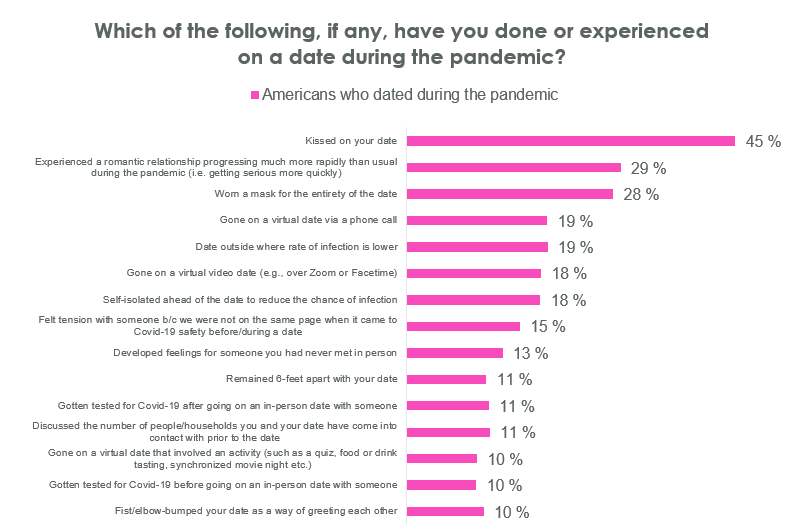
Over twice as many women as men developed feelings for someone they had never met in person during the pandemic
In some instances, dating affected women differently than men. One fifth (20%) of women reported feeling tension with their date because they weren’t on the same page as them when it came to COVID, compared to just 12% of men. In addition, one in five women developed feelings for someone they had never met in person (20%) compared to only 8% of men.
Time on dating apps increased during the pandemic
Dating app users have spent more time on apps during the pandemic, rather than less. Nearly half (46%) found themselves spending more time on dating apps compared to before the pandemic. Meanwhile, only one in five (20%) spent less time on them.
The top three dating apps Americans are using include: Tinder (26%), Bumble (15%) and Match.com (15%). Relative to other age groups, 25-34-year-olds are the most likely to be on Tinder (37%). This age group is also the most likely to be on the popular dating app, Hinge (10%).
Over half (53%) say they know what they want in relationships more than before the pandemic
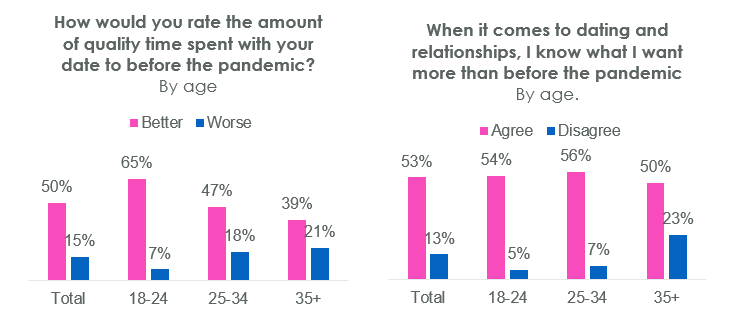
Overall, half (50%) of those who dated during the pandemic agree that the amount of quality time spent with their date improved. Among the 65% of 18-24 year olds who agree quality time with their date got better, two in five (40%) strongly agreed with this statement, suggesting this sentiment is especially shared among younger age groups. Having little-to-nothing to do during the pandemic may have allowed people to dedicate more time to the person they were seeing.
Over half (53%) of those who dated say they know what they want in their relationships and dating life more now than they did before the pandemic. Only 5% of those aged 18-24 and 7% of those aged 25-34 disagree with this statement, suggesting that younger people who dated during the pandemic learned a lot about themselves.
Men are more likely to feel more optimistic about their dating life since the pandemic began
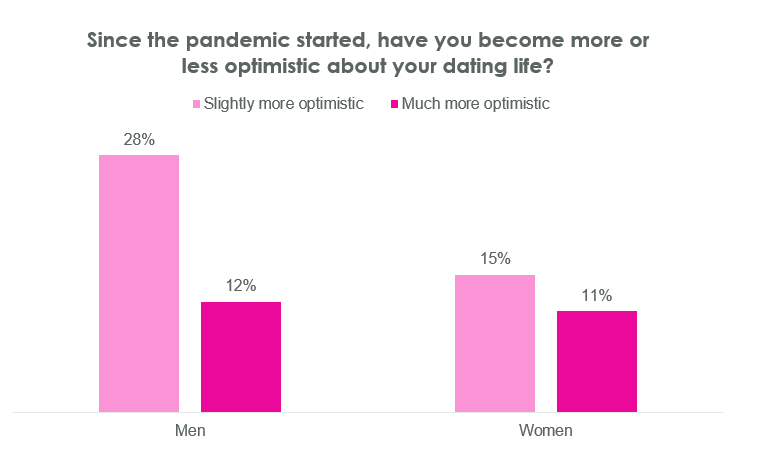
Over a third (35%) of people who dated during the pandemic feel more optimistic about their dating lives since Covid-19 began, while only 15% feel less optimistic. Men feel significantly more optimistic about their dating life than women, with 40% of men feeling more optimistic, compared to only 26% of women.
Younger people appreciate that virtual dating saves money and time
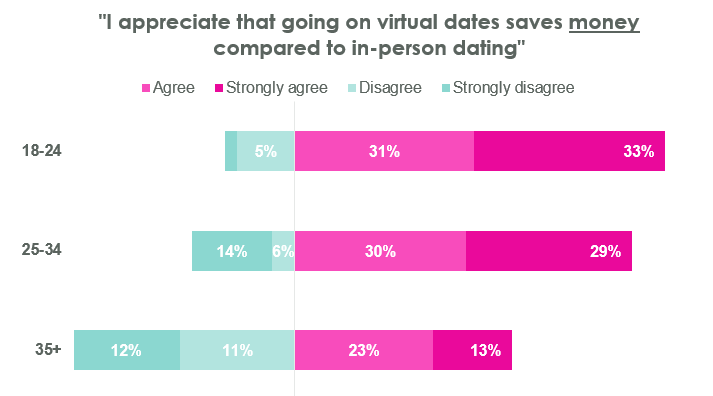
When it comes to virtual dating, there are things that people have come to appreciate. Among those who dated during the pandemic, over half (51%) agree with the statement: ‘I appreciate that going on virtual dates saves money compared to in-person dating.’ Moreover, 47% agree with the statement: ‘I appreciate that going on virtual dates saves time compared to in-person dating.” Younger daters, aged 18-24, especially appreciate how virtual dates saves them money and time, 64% and 58% respectively.
Despite the efficiencies, virtual dating is unlikely to stick around
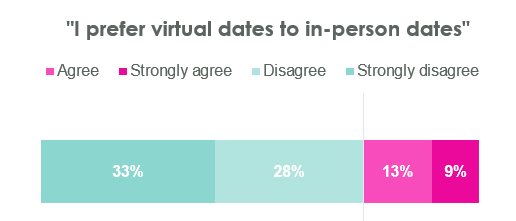
Close to two thirds (61%) of Americans who dated during the pandemic disagree with the statement: “I prefer virtual dates to in-person dates” – one third (33%) ‘strongly’ disagreed. Although we have willingly shifted some aspects of our lives online because of the pandemic, we are not quite ready to give up in-person dating for its virtual alternative despite its efficiencies.
Methodology
The research was conducted on Opinium’s US Consumer Omnibus among 2002 US Adults aged 18+ weighted by age, gender, and region to be nationally representative of the country. The research was in field from July 2nd – 9th, 2021.
To be notified of our latest research when it goes live, sign up here.



